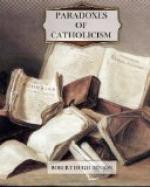All things are hers, for she is Christ’s. Yet, nevertheless, she will suffer the loss of all things sooner than lose Him.
III
SANCTITY AND SIN
Holy, Holy, Holy!—IS. VI. 3.
Christ Jesus came into this world to save sinners_. I TIM. I. 15.
A very different pair of charges—and far more vital—than those more or less economic accusations of worldliness and otherworldliness which we have just considered, concern the standards of goodness preached by the Church and her own alleged incapacity to live up to them. These may be briefly summed up by saying that one-half the world considers the Church too holy for human life, and the other half, not holy enough. We may name these critics, respectively, the Pagan and the Puritan.
I. It is the Pagan who charges her with excessive Holiness.
“You Catholics,” he tells us, “are far too hard on sin and not nearly indulgent enough towards poor human nature. Let me take as an instance the sins of the flesh. Now here is a set of desires implanted by God or Nature (as you choose to name the Power behind life) for wise and indeed essential purposes. These desires are probably the very fiercest known to man and certainly the most alluring; and human nature is, as we know, an extraordinarily inconsistent and vacillating thing. Now I am aware that the abuse of these passions leads to disaster and that Nature has her inexorable laws and penalties; but you Catholics add a new horror to life by an absurd and irrational insistence on the offence that this abuse causes before God. For not only do you fiercely denounce the “acts of sin,” as you name them, but you presume to go deeper still to the very desire itself, as it would seem. You are unpractical and cruel enough to say that the very thought of sin deliberately entertained can cut off the soul that indulges in it from the favour of God.
“Or, to go further, consider the impossible ideals which you hold up with regard to matrimony. These ideals have a certain beauty of their own to persons who can embrace them; they may perhaps be, to use a Catholic phrase, Counsels of Perfection; but it is merely ludicrous to insist upon them as rules of conduct for all mankind. Human Nature is human nature. You cannot bind the many by the dreams of the few.
“Or, to take a wider view altogether, consider the general standards you hold up to us in the lives of your saints. These saints appear to the ordinary common-place man as simply not admirable at all. It does not seem to us admirable that St. Aloysius should scarcely lift his eyes from the ground, or that St. Teresa should shut herself up in a cell, or that St. Francis should scourge himself with briers for fear of committing sin. That kind of attitude is too fantastically fastidious altogether. You Catholics seem to aim at a standard that is simply




